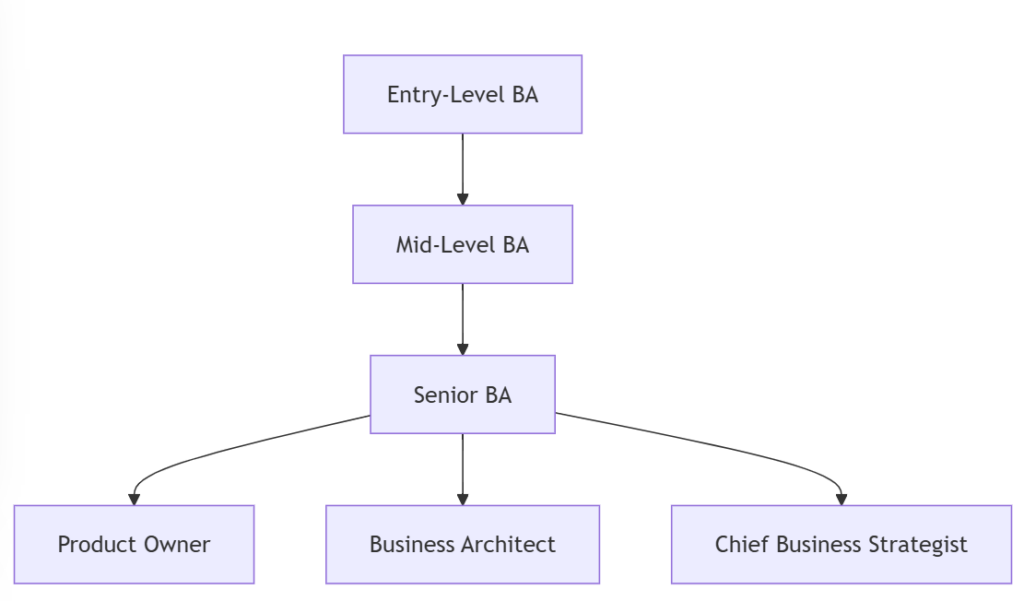What is Business Analysis?
Have you been hearing about business analysis and you’re not quite sure what that is? And what does a business analyst do? In this article I’ll share with you what business analysis really is.
Business Analysis Definition
Here’s what business analysis is adapted from the Guide to the Business Analysis Body of Knowledge (BABOK) from the International Institute of Business Analysis (IIBA):
Business analysis is the practice of enabling change in an organization by defining needs and recommending solutions that deliver value to stakeholders. Business analysis enables an organization to articulate needs and the rationale for change and to design and describe solutions that deliver value.
Nice definition IIBA, but what does that actually mean -exactly? Well let me break it down for you.
Here’s the real world grass roots version of the definition above:
Business analysis is the use of tools and techniques to deliver value to stakeholders.
Therefore, business analysis is the practice of identifying business needs and determining solutions to business problems. These solutions may include process improvements, technology implementations, strategic planning, or organizational changes.
The Role of a Business Analyst
A Business Analyst (BA) is responsible for:
- Eliciting requirements from stakeholders.
- Analyzing business processes to identify inefficiencies.
- Documenting requirements in formats such as BRDs, user stories, or process flows.
- Collaborating with technical teams to implement solutions.
- Ensuring successful project execution through continuous evaluation and refinement.
What does a Business Analyst Do?
Key Responsibilities of a Business Analyst
1. Requirement Elicitation and Documentation
- Conduct interviews, workshops, and surveys to gather business needs.
- Document requirements using Business Requirements Documents (BRD), User Stories, and Functional Specifications.
- Maintain traceability between requirements and project objectives.
2. Process Analysis and Improvement
- Assess current workflows and identify inefficiencies.
- Propose enhancements using methodologies such as Lean, Six Sigma, and BPMN.
- Develop process maps and visual diagrams to represent workflows.
3. Stakeholder Communication and Management
- Bridge the gap between business teams, IT, and executives.
- Conduct requirement walkthroughs and gather stakeholder feedback.
- Address conflicting priorities and ensure alignment on project goals.
4. Solution Evaluation and Testing
- Collaborate with QA teams to ensure requirements are met.
- Perform User Acceptance Testing (UAT) to validate solutions.
- Continuously monitor and optimize implemented solutions.
Basically in this job you will be presented with a number of business problems and you will follow the steps to perform business analysis. Your job is to systematically:
- Uncover the underlying problems
- Facilitate the discovery of the solution
- Document the solution
- Test that the solution solves the problem.
- Create awareness of the solution developed
As my not-so-eloquent BA co-worker Matt once told me: “Everything that lands on my desk is a mess and my job is to make sense of it!” and he was not wrong. Your work life will be to take messy or undefined processes or systems and make them better.
In this role as a Business Analyst, you are always given problems and you have to figure out the best way to solve them in order to satisfy all the stakeholders involved. But don’t worry you will not be solving all these problems by yourself. You will work in a team and facilitate the discussions so the team can come up with the solutions.
If you are wondering is business analysis right for me? then I suggest you do the free business analysis fit test and evaluate your innate behaviors to figure out if you would be right for this role.
If you don’t like solving problems then you are probably not going to be a good business analyst.
Nothing comes to you right or in good order in this job. Everything has issues and the more advanced you become as a Business Analyst, the greater the issues are that get assigned to you.
Business Analyst Methodologies
Agile Business Analysis
- Focuses on iterative development and continuous feedback.
- Uses techniques such as Scrum, Kanban, and SAFe.
- Business Analysts often act as Product Owners in Agile environments.
2. Waterfall Approach
- A linear methodology where each phase (e.g., Requirement Gathering, Design, Development, Testing, Deployment) is completed before moving to the next.
- Ideal for well-defined, structured projects with clear requirements.
3. Design Thinking for Business Analysis
- Prioritizes user needs and emphasizes innovative solutions.
- Involves phases like Empathize, Define, Ideate, Prototype, and Test.
Business Analysis Tool and Techniques
Since business analysis is the use of tools and techniques to deliver value to stakeholders, then you might ask how exactly do you acquire these techniques? and what tools are you talking about? and who are these stakeholders?
All valid questions. Lets address them.
Let’s start with techniques. There are a variety of techniques to choose from in this role. Here are the top 10 elicitation techniques, including stakeholder interviews, brainstorming, document analysis, observation among others.
Elicitation techniques are the various ways to uncover the underlying problems. The article Business analysis techniques gives more details on this.
Business Analysis tools
Some techniques require the right tools.
The tools needed to do the business analyst job can be as fancy as complicated software or as simple as a notebook. (See the refinement notebook built for Business Analysts)
What matters most is the ability to use the tools to achieve the objective in the most efficient way. Most business analysts use the Microsoft suite of products including Word, Excel and Powerpoint. For a list of other tools see this article.
You can also watch this video on Top Software Tools for Business Analysts.
Skills Required to Succeed as a Business Analyst
1. Analytical and Problem-Solving Skills
- Ability to assess data and trends to provide actionable insights.
- Use of data analysis tools like Excel, Power BI, and SQL.
2. Communication and Stakeholder Management
- Strong verbal and written skills for documentation and presentations.
- Ability to negotiate and influence decisions across teams.
3. Technical Proficiency
- Understanding of databases, APIs, and cloud technologies.
- Hands-on experience with tools like Jira, Confluence, Visio, and Lucidchart.
4. Knowledge of Business Process Modeling
- Expertise in BPMN, UML, and flowcharting techniques.
Industries Where Business Analysts Work
Business Analysts are essential across various industries, including:
| Industry | Business Analyst Role |
|---|---|
| Finance & Banking | Risk assessment, fraud detection, compliance analysis. |
| Healthcare | Process optimization, EHR system implementation. |
| Retail & E-commerce | Inventory management, customer journey analysis. |
| IT & Software | Agile product development, API integration. |
| Government & Public Sector | Policy analysis, digital transformation. |
Business Analyst Certifications
Earning a certification enhances career prospects and validates expertise.
Top Business Analyst Certifications:
- Certified Business Analysis Professional (CBAP) – IIBA
- Entry Certificate in Business Analysis (ECBA) – IIBA
- PMI Professional in Business Analysis (PMI-PBA) – PMI
- Certified Scrum Product Owner (CSPO) – Scrum Alliance
Get the experience of being a business analysis before you land the job!
Since you have gotten this far in the article, now I can reward you with the secret hack to starting your BA career. You can practice being a BA with expert guidance from Karaleise.
The Back Office Club by Karaleise is the only place you can experience working as a business analyst BEFORE you land a job. You will network with other BAs and you will get access to tools documents and training to help you excel in your career. Join today!
Business Analyst Career Path
Business Analysts have multiple career progression opportunities:
- Entry-Level BA: Works on requirement gathering and documentation.
- Mid-Level BA: Engages in process improvements and strategic initiatives.
- Senior BA: Leads teams and oversees enterprise-wide solutions.
- Product Owner: Manages product backlog and Agile execution.
- Business Architect: Focuses on high-level strategy and enterprise transformation.
- Chief Business Strategist: Aligns business objectives with technology solutions.
Business Analyst Salary Trends
Salaries vary based on experience, location, and industry.
| Experience Level | Average Salary (USD) in 2025 |
|---|---|
| Entry-Level BA | $70000 – $85,000 |
| Mid-Level BA | $85,000 – $100,000 |
| Senior BA | $100,000 – $130,000 |
| Lead BA / Consultant | $130,000+ |
The Future of Business Analysis
The demand for Business Analysts is growing as organizations increasingly rely on data-driven decision-making.
Key Trends for Business Analysts:
- AI and Automation: Business Analysts will leverage AI tools for predictive analytics.
- Data-Driven Decision Making: Greater emphasis on data analysis and visualization.
- Cross-Functional Roles: BAs will work closely with UX designers, data scientists, and cloud architects.
- Remote & Hybrid Work: Virtual collaboration tools like Miro, Slack, and MS Teams will dominate.
Conclusion
Business Analysis is a dynamic and rewarding profession that plays a crucial role in bridging business needs with technology solutions. Whether you’re entering the field or advancing your career, mastering business analysis methodologies, tools, and industry best practices is key to long-term success.
Was this helpful? Do you now know more about the Business Analyst role than you did before? I hope so!
Watch this video for more on How to become a business Analyst
Also check out: A day in the life of a business analyst in 2025
















